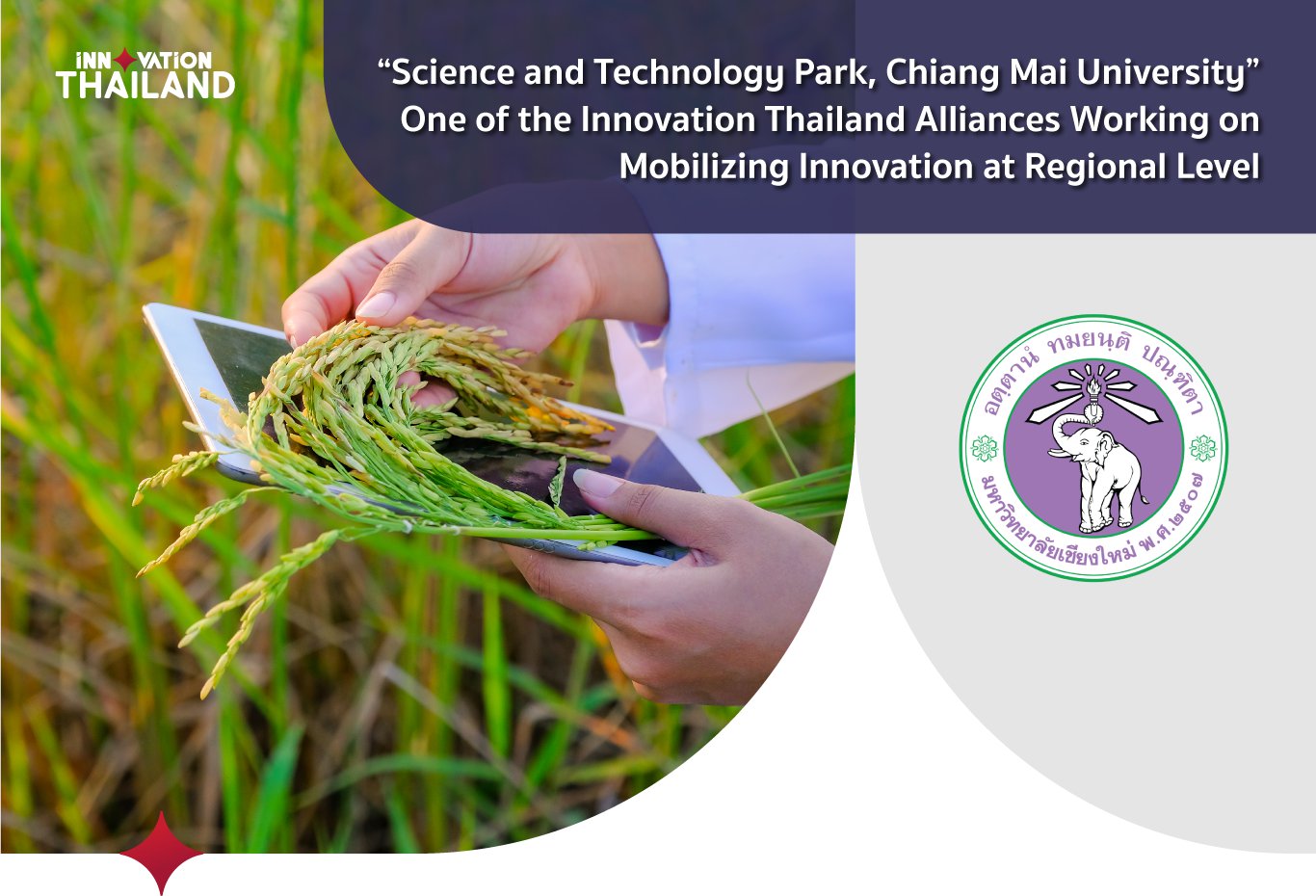Blog
Science and Technology Park, Chiang Mai University” One of the Innovation Thailand Alliances Working on Mobilizing Innovation at Regional Level

An educational institution is one of the key drivers for innovation in our country whether it be providing curriculum for producing a new generation of innovators or serving as an academic and research service provider for the business sector, the society and communities to create innovations countrywide. Today, Innovation Thailand has the opportunity to introduce “Science and Technology Park, Chiang Mai University (STeP),” one of the Innovation Thailand Alliances. In our interview with Assistant Professor Dr. Tanyanuparb Anantana, Director of Science and Technology Park, Chiang Mai University, we will learn more about the role of the Science and Technology Park in mobilizing innovations across Northern Thailand…
Could you describe an overview of innovation in Thailand nowadays?
Innovation in Thailand is gearing towards the right direction for growth. We are doing better in the ranking, reflecting the prospects for development in Thailand. Still, this is concentrated only in the central and Eastern Economic Corridor (EEC) areas. In fact, the development of innovation should be dispersed across the country which can be achieved by improving the Innovation Ecosystem, the Innovation District and utilizing the resources of the universities to establish an innovation-driven economy and society in the region. As a result, many more regional economic corridors can be achieved including the Northern Economic Corridor, Northeastern Economic Corridor, Central-Western Economic Corridor and Southern Economic Corridor, all of which are destined to be the key drivers in each region.

What are the strategies of the Science and Technology Park for promoting innovation?
The Science and Technology Park, Chiang Mai University (STeP) plays a role in bridging innovation through the following 3 main approaches: Enhancing Tech Commercialization (Inside-out Approach), Collaborative research with companies (Outside-in Approach) and Startup Incubation (Tech Startup Approach). All these three approaches have enabled our entrepreneurs to use their knowledge, research and technology to enhance competitiveness through product development and stimulate the innovation-driven economy in the country.
What are the examples of innovations from the entrepreneurs who receive STeP’s support?
Chiang Mai University has supported the development of various innovation projects. For instance,
- Radio Frequency Technology for killing insects and insect eggs in rice: the RF technology would cause the molecules to vibrate, making them to heat up and destroy insects and insect eggs in rice, a better substitution of chemical pesticides. Yont Phol Dee Co., Ltd. has adopted this technology in its rice milling business and has successfully made it to the Thai innovation list.
- "P80" Longan Natural Extract: According to the research, P80 Natural Essence, a natural extract from longan fruit, provides health benefits, resulting in improved sleep, relief from everyday stress as well as relief from joint pains and back pain. P80 is manufactured and marketed by PM Group Co., Ltd.. Purchasing longan fruit directly from the farmers at a higher price than the market price, the Company has helped reduce the longan oversupply problem and add value to Thai agricultural products.
- Cold Atmospheric Pressure Plasma Technology: Developed as an air plasma jet engine in treatment of wound infection, the engine has unique features which include killing bacteria, stimulating the growth of new cells and tissues with no cytotoxicity to normal skin cells nor chemical residue. The Compact Air Plasma Jet consumes no more than 5 baht per person per month, a very cost-saving solution. Innoplascm Co.,Ltd. has manufactured and received the generous support to market this Compact Air Plasma Jet with CE mark. The product is undergoing a Clinical trial to further register for GMP for Medical Devices.
- Mastitis Test Kit with Drug Sensitivity Test is a highly effective means of helping dairy farmers detect the pathogens that cause mastitis without having to send the sample to the laboratory, offering them convenient check-ups and proper treatment decisions to reduce the use of antibiotics. The technology also helps prevent outbreaks in the farms and minimize subsequent losses, such as a decline in milk quantity and quality. The first test kit has been researched and developed with up to 90% accuracy rate. The research team has received support for the establishment as a start-up for commercial production and distribution of the test kit.
- Dental Implant Innovation: With the innovative development, the shape and material of the dental implant is specially designed to make only a small incision so that the implant can be inserted to the jaw bone, making the patient less in pain. This also results in less tissue damage and faster wound recovery. The device also adheres well to the bone. Dental implants can be completed in one visit. In case of any damages, its head can be replaced without the need to removing the implant. The dental implant innovation is certified with CE Mark for Medical Devices (MDD 93/42/EEC), ISO 13485 and Good Manufacturing Practice. Currently, the team is in the phase of identifying the investors in the joint venture for the product to be manufactured and marketed.

Collaboration projects between Chiang Mai University and NIA
Chiang Mai University has multiple fruitful collaboration projects on innovation with NIA, including those that develop and incubate Startup, by sending a team or entrepreneurs to join the programs such as Northern Innovation Startup Thailand; NIST, Startup Thailand League, Suandok Medical Innovation District (SMID), organized by the Faculty of Medicine, Chiang Mai University. NIA is committed to sustainably serving as the center for medical innovation in the region through the projects, namely, Thailand InnoBIZ Champion and the Northern Thailand Food Valley (NTFV). The objective is to achieve the Northern Food Innovation Economic Zone, Open Innovation and Food Incubation Kitchen Playground for Startup/SMEs entrepreneurs in the Northern Food Innovation Economic Zone.
In your view, what role does “Innovation Thailand Alliance” play in driving innovation in Thailand?
Innovation Thailand Alliance do synergize and strengthen the initiatives across the alliances, to drive Thailand towards an innovation-driven economy. As for the Science and Technology Park, Chiang Mai University, our mission is to serve as a bridge for promoting innovation by combining resources from the university and strengthening the cooperation across different sectors to drive the Regional Development. As a result, the entrepreneurs / communities / students / professors and researchers can leverage their business and benefit from our knowledge support. We also encourage the commercialization of startup capabilities in order to create a positive impact on our society while enabling the entrepreneurs and communities in Chiang Mai and the surrounding areas to become more competitive and realize sustainable spatial development in the long run.
The Science and Technology Park, Chiang Mai University is, thus, one of the Innovation Thailand Alliances that stand strong as a role model for the educational institutions fulfilling its mission to provide academic services and develop the new generations of innovators, business owners and communities as an asset for the regional pride.

 Facebook
Facebook Youtube
Youtube